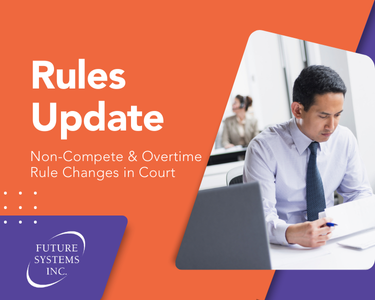Earlier this year, two federal rulings—one from the Federal Trade Commission and one from the Department of Labor, were set to change overtime regulations and the legality of non-compete contracts.
There have since been setbacks to both, meaning that employers may need to stay tuned for possible appeals. Here’s what you need to know about both rules.
Federal Overtime Rule
The Department of Labor's (DOL) updated overtime rule, which set to increase salary thresholds for overtime pay, was officially struck down on November 15 by a District Court Judge in Texas.
The ruling means that the annual threshold will return to $35,568, and only those earning less than that amount are eligible for overtime pay. This amount will not increase to $58,656 on January 1, as was previously anticipated.
The Department of Labor has the power to appeal the decision, but the transitioning Trump administration has not commented on whether it has intentions to.
Overview
- Salary threshold: The rule increased the minimum salary threshold for exempt employees to $844 per week ($43,888 annually) as of July 1, 2024. The second phase--raising the threshold to $1,128 per week ($58,656 annually), was scheduled to take effect on January 1, 2025.
- Scope: This rule would not impact state and local overtime exemption laws. Employers must still comply with these laws, which in some states—like California, New York, and Washington—set salary thresholds higher than the current federal level.
- Legal challenges: Several lawsuits have been filed against the DOL, with mixed results. One challenge resulted in the State of Texas being granted a limited injunction as an employer. At the time, this injunction only covered people employed by the State of Texas. On Nov 15, a judge from the US District Court for the Eastern District of Texas issues a decision that struck down the national ruling entirely.
Advice for Employers
- Employers can hold off on implementing changes if they haven’t yet communicated them to employees. If changes have been communicated but not implemented, employers can revise the message to inform employees that the planned changes won’t occur.
- Employers that increased their exempt employees’ salaries to comply with the July 1 increase are advised to discuss possible next steps with their legal counsel.
Non-Compete Rule
The Federal Trade Commission’s (FTC) proposed rule banning non-compete agreements has faced numerous legal challenges, and in August 2024, a Texas federal judge issued a nationwide injunction on its implementation.
Overview
- FTC rule: The FTC's rule, originally scheduled to go into effect on September 4, 2024, would have prohibited most new non-compete agreements and nullified existing agreements. Employers would have been required to notify affected employees about the change.
- The injunction: A federal judge blocked the rule's enforcement, citing concerns about the FTC's authority. According to the U.S. Chamber of Commerce, an opponent of the non-compete ban, this was a victory in the “fight against government micromanagement of business decisions.”
- Conclusion: The rule’s ultimate fate remains to be seen, considering the FTC is likely to appeal the judge’s decision. An appeal could eventually take the rule all the way to the U.S. Supreme Court for a final decision. In the meantime, state laws covering non-compete regulations remain in effect.
Advice for Employers:
- Review agreements: Evaluate your existing non-compete agreements to ensure they comply with your state’s specific regulations.
- Consider alternatives: Explore other methods to protect your business interests, such as trade secret agreements or intellectual property protections, and move away from using non-compete agreements.
Stay Updated with Future Systems
Whether it’s non-compete clauses and overtime rules, or the latest trends in compensation, business leaders need to stay current in order to remain compliant and competitive. Follow this blog for all of the latest news in HR, payroll, tax processing, and timekeeping solutions, and reach out today for help preparing your business.
